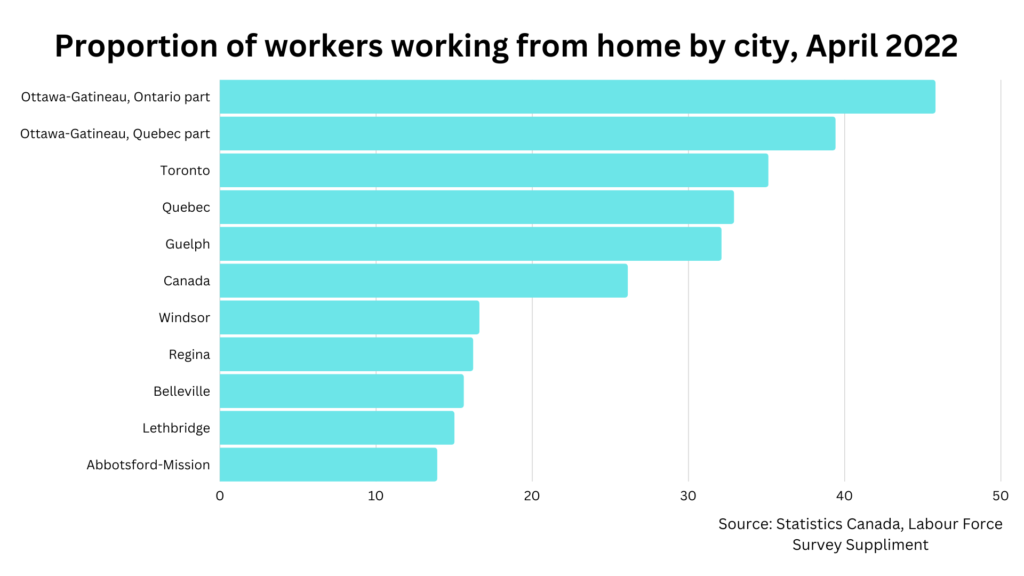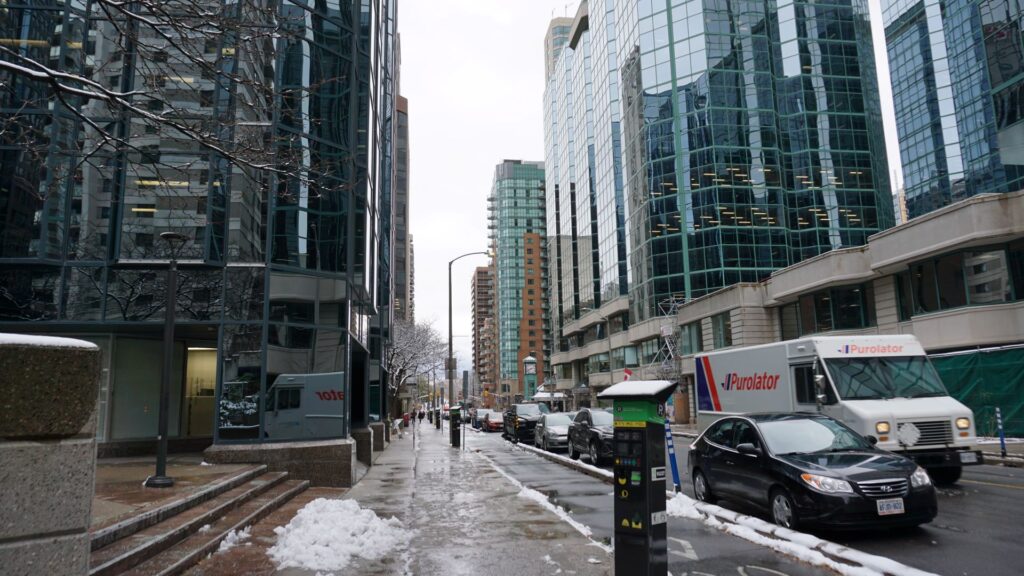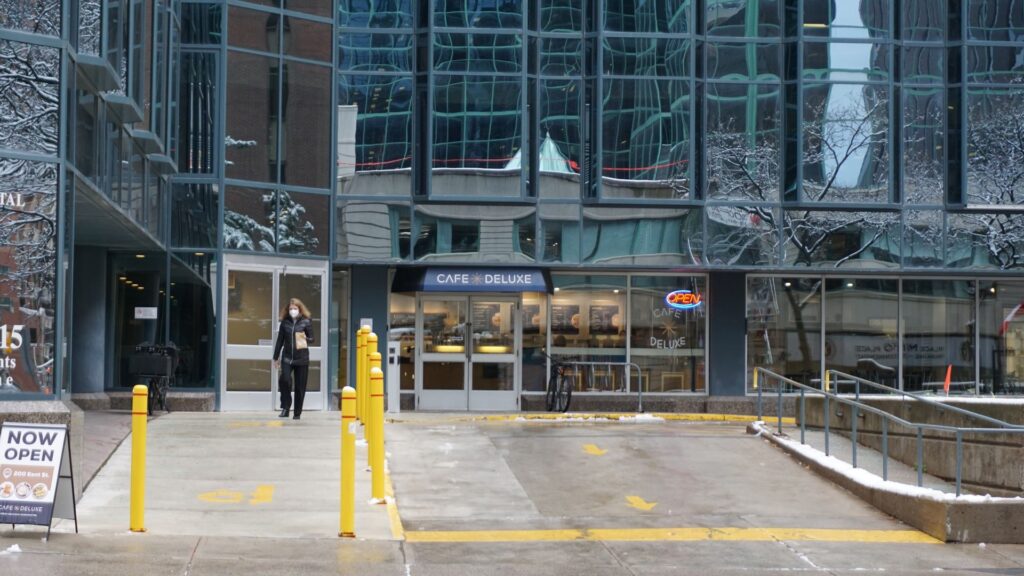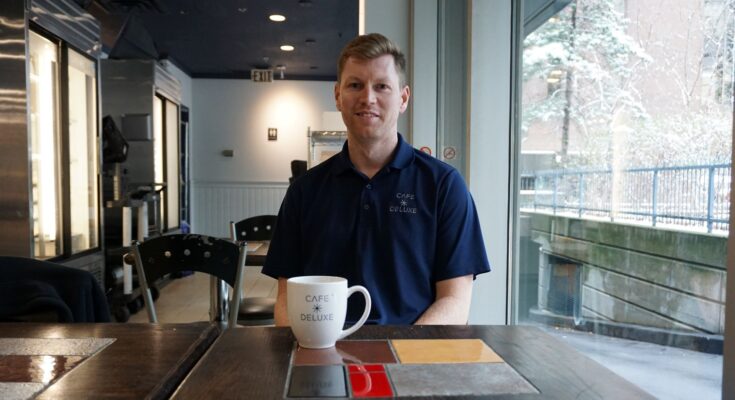By: Nathan Fung
Cafe Deluxe on Laurier Street is surrounded on all sides by towering office complexes. The coffee shop is on the ground floor of Centennial Towers, a 15-storey office building covered with mirror-like glass.
The restaurant has been at its current location for a year, but it’s been serving the downtown area for 21 years.
Brendan Mears, the business’s co-owner, says he estimates around half of the businesses in downtown Ottawa have permanently closed shop. These businesses include dry cleaners, tailors, shoe repair shops, cafes and restaurants.
“It’s been devastating for the area,” he said. “We’re very fortunate that we’re still in business. Many of our neighbours sadly are not. We’re just grateful we were able to survive.”
Data from Statistics Canada in April shows that 45.8 per cent of Ottawa workers work from home compared to the national average of 26.1 per cent.
Some blame this high rate of remote work for the slow-down in the core’s economy. Others are advocating rethinking how the government city’s downtown works.

Stakeholders and politicians in Ottawa are grappling with ways to revitalize the downtown area because the nine-to-five commuters that many local businesses depend on continue to work remotely. Some of the ideas on the table include converting office spaces to housing and pivoting businesses to serve residents instead of commuters.
In July, Ottawa Centre MP Yasir Naqvi unveiled the Downtown Ottawa Revitalization Task Force. The 13-member task force includes Christine Leadman, executive director of the Bank Street Business Improvement Area, as well as Ariel Troster, the newly-elected councillor for Somerset ward.
“Our focus as a task force is to look at ideas, look at solutions, that will bring people to the downtown to work, to live and to visit,” Naqvi said Friday.
Naqvi said the task force isn’t working with a deadline in mind but has been meeting regularly. He said he hopes to be able to come up with ideas that could feed into the City of Ottawa’s budget next year, and for the federal government’s budget process should additional funding be needed.
“Downtown is for everyone,” Naqvi said. “We’re a capital city of a G7 country. Anyone who comes to Ottawa will come to our downtown core. The seat of our democracy is located in the downtown core.”
Returning to the office

The Canadian Board of Commerce, along with 31 other business associations, including the Ottawa Board of Trade, signed a letter in October urging the federal government to bring their employees back to the office as rapidly as possible.
The letter said the federal government should lead the way in getting workers to return to offices so that others would do the same.
“The federal government is not only a major employer in cities and communities across Canada, but in many places it is the anchor employer,” the letter said.
“As businesses in these communities assess their long-term viability given the pandemic’s damaging effects on downtown centres, restoring normal economic activity requires the federal government to act now.”
But Leadman said they don’t see the return of office workers to the downtown core as a viable solution.
“We can’t be looking over our shoulder expecting the past to reappear again,” Leadman said. “You can’t move forward if you’re always looking back.”
In a separate interview, Troster echoed Leadman.
“I don’t believe we should force people to come downtown,” she said. “We should have them want to come downtown because there’s great places to eat, fabulous spaces to hang out in, a great cycling network, and their friends and family live there.”

Pivoting to residents
Cafe Deluxe’s clientele used to largely consist of corporate clients downtown. But when the streets were emptied of workers, the coffee shop had to pivot the business to cater to residents instead, he said.
“We definitely had to shift that focus because there was absolutely nobody downtown,” he said.
Troster said many of the businesses that stayed open through the pandemic had to learn to pivot to serve residents instead of commuters. An example of this, she said, is City Goose, a newer restaurant that opened on Bank Street by Flora Street a month after the pandemic started.
The restaurant created a new brand for its Uber Eats persona to appeal to Ottawans during the pandemic. Rather than using the name City Goose, the restaurant goes by Pizza Nerds on the mobile food delivery app.
“It’s confusing. It’s a little odd. It’s probably not the smartest. But neither are we!” the restaurant’s website said.
Troster said she hopes more businesses learn to pivot in the same way City Goose did with Pizza Nerds.
Quality of life in the core
Another thing Troster said she wants to see moving forward is a focus on building more affordable housing in the area.
Some ideas for increasing the accessibility of affordable housing are to convert unused office space into residential space and tap into the federal government’s rapid housing initiative for funding.
While these ideas present opportunities for the downtown core, Troster and Leadman said they recognize the challenges that come with converting spaces from commercial to residential. One challenge, for example, is the difference in building standards between the two.
In addition to increasing the number of affordable housing units, Troster said improvements to public spaces in the area would make the city core more dynamic. She said Somerset Ward has the least amount of tree coverage compared to the rest of the city, which is another factor that contributes to the quality of life for residents in the core.
No silver bullet
While Mears, the co-owner of Cafe Deluxe, said the pandemic has been devastating for downtown Ottawa, he’s seen a surge in business in the last three to four months.
He attributed this to the smaller number of cafes and restaurants that serve the community, and the partial return of workers to the office, even if it’s just a few days a week.
Mears said he doesn’t know if forcing people back into the office is the answer, or if converting office space into residential space offers a solution. But he said he would like to see more people return to the core.
“I don’t know if there’s a silver bullet answer to that,” he said. “If we’d like to be a more vibrant downtown city or even a city as a whole, I think it’s important to have a lively core.”




